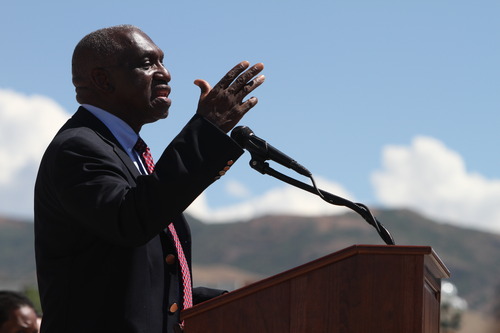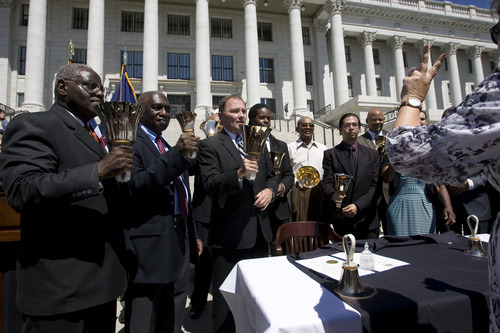This is an archived article that was published on sltrib.com in 2013, and information in the article may be outdated. It is provided only for personal research purposes and may not be reprinted.
It may be the most famous speech of the 20th century.
Millions of American schoolchildren who never experienced Jim Crow or whites-only water fountains know the phrase "I have a dream."
And many American adults can recite from memory certain phrases: the Rev. Martin Luther King Jr.'s use of the prophet Amos' vision of justice rolling down "like waters and righteousness like a mighty stream" or the line about children being judged not by "the color of their skin but the content of their character."
Emblazoned on T-shirts, reprinted on posters and in textbooks, the speech has become an iconic part of the American experience. As the nation celebrated the 50th anniversary of the March on Washington this week, many Utahns and Americans participated in events, including a commemorative march in the nation's capital and a bell-ringing ceremony at Utah's Capitol.
To many in this country, "I have a dream" has a place of honor next to the Declaration of Independence, the Emancipation Proclamation and the Gettysburg Address. It celebrates the lofty ideals of freedom.
Through the years, the speech has become part of the nation's civil religion — a set of beliefs, and rituals, that are partly religious and partly political and inform the country's core values of freedom, equality and rule of law.
But scholars say it would be a mistake to celebrate the speech without also acknowledging its profound critique of American values.
"On the one hand, he appeals to Scripture and the Constitution," said Josef Sorett, professor of religion and African-American studies at Columbia University. "At the same time, he's also critiquing those texts because the nation has not lived up to what it professes to be."
King began his speech "Five score years ago," echoing Lincoln's famous "Four score and seven years ago" from the Gettysburg Address.
He then talked of coming to the nation's capital to cash a check, a promissory note that the country owed blacks because of the Declaration's promise that all men are created equal and have inalienable rights to life, liberty and the pursuit of happiness.
But there's a subversive subtext in that promise; the founders never envisioned equality for African Americans.
"King embraces American values not to celebrate it, but to point out that we've never fulfilled those values," said Jonathan Rieder, a sociologist at Barnard College and the author of "Gospel of Freedom: Martin Luther King, Jr.'s Letter from Birmingham Jail and the Struggle That Changed a Nation."
"He's saying if you believe these things, then you have to act to cure your sinfulness."
Historians of the era say King was angry with government, churches and society for their unwillingness to challenge black inequality. But as he prepared his speech on the Mall, he had to dial it back for pragmatic political reasons, including the Kennedy administration's initial opposition to the march.
"King didn't want to do anything that was going to spoil the chances of the civil-rights bill," Rieder said, "or create a backlash with Congress."
So he wrote the address with Congress and Northern white supporters in mind.
Like other statesmen before him, he framed the struggle to achieve equality in religious terms, by invoking the book of Exodus, the account of God guiding the Israelites out of slavery in Egypt and toward the Promised Land.
"One hundred years later, the Negro is still languishing in the corners of American society," King said, "and finds himself an exile in his own land."
But in the second and most popular part of the speech, King abandoned his careful notes and swerved into a call-and-response motif from the black church — the "I have a dream" sequence.
Invoking the biblical prophets Isaiah and Amos, the sequence marks a shift toward the future where King invokes God's vision for America.
Just as the prophets were called seers, "one has the sense King is seeing things the rest of the country can't make out," said Richard Lischer, professor of preaching at Duke Divinity School who wrote a book on King. "He's looking out on the horizon with a prophetic imagination we don't have."
In that famous sequence, King saw a future where the descendants of former slaves and former slave owners could share a meal, where white and black children could walk together as brothers and sisters.
Neither of those things was possible in 1963, especially in the South with its segregated restaurants, schools, movie theaters, basketball courts and swimming pools.
"The celebration of 'I have a dream' often has as its condition a failure to take seriously the prophetic vision that was central to King that was not comforting, was not convenient, was full of rebuke and didn't celebrate the nation," Rieder said.
And while some might point to President Barack Obama's election as proof that the dream has been realized, many scholars point to disparities between whites and blacks in education, employment and incarceration as proof that a lot of work still must be done.
The speech is even more significant now, said Lewis Baldwin, a professor of religion at Vanderbilt University, "because poverty is much more pervasive than it was in King's time. Homelessness is much more pervasive than the problem was in King's time."
"The American dream is still something that we have to work toward and we have to struggle for," Baldwin said. "We have to be on a mission to achieve it."





